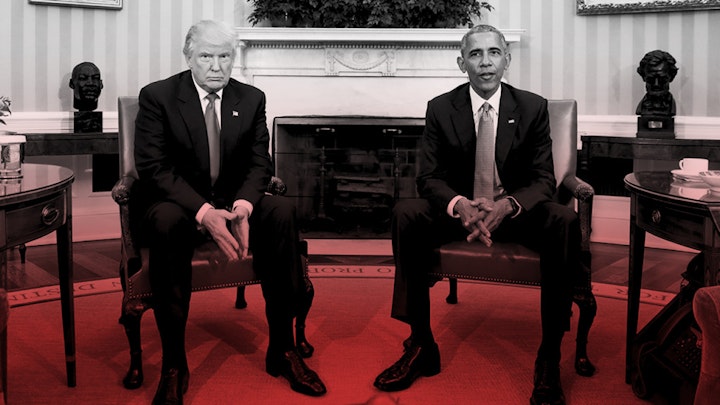
Photography licensed by Playboy and owned by Pablo Martinez Monsivais/AP/REX/Shutterstock.
[Original post can be found on archived site.]
The Trump administration can’t catch a break when it comes to dismantling President Barack Obama’s legacy. The administration’s latest defeat comes in the form of a federal court ruling that the Environmental Protection Agency, currently run by fossil fuel enthusiast Scott Pruitt, must enforce an Obama-era policy that regulates methane emissions within the natural gas and oil industry—a regulation Pruitt claims is too costly.
The ruling, handed down by the Court of Appeals for the District of Columbia Circuit, follows an effort by Pruitt to delay the enforcement, which was set to commence on June 3, 2017, by two years in order to prove that the new standards would severely impact oil companies. In April, Pruitt wrote a letter to oil and gas leaders alerting them that the agency was reconsidering Obama’s regulation, giving those leaders false promise that he had the power to overturn it. Approved in 2016, the rule, which is part of the Clean Air Act, sets limits for greenhouse emissions as well as requires oil companies to identify and fix leaks. But the court ruled that the EPA cannot delay its implementation any longer “[having] not offered any support for the proposition that compliance…would cause significant hardship to regulated entities that had a year’s lead time to prepare.”
Over the course of his two-year term, President Obama oversaw the passing and/or implementation of almost 4,000 new EPA rules and restrictions, making him one of the most environmentally conscious presidents to date. His legacy as a pro-environment POTUS culminated in his blocking of the construction of the Dakota Access Pipeline in December and his April 2016 signing of the Paris Accords, from which President Trump withdrew earlier this year.
Trump’s most recognizable policy positions haven’t been the work of true democracy.
Throughout Obama’s term, Republicans have argued increased regulations by the EPA on the country’s coal- and oil-based energy industries were too costly and hurt big businesses, with one estimate suggesting the annual EPA compliance costs reached $50 billion. Obama’s committment to a cleaner environment thus turned into a war against capitalism. In his July 2016 testimony to the House Committee on Energy and Commerce, David Porter, the chairman of the Railroad Commission of Texas stated, “The President disregards the Constitutional limits of his office and public opinion to forward his own liberal agenda that combats fossil fuels and favors unreliable and costly alternative energy sources. In promoting this agenda, he has allowed EPA to become the mouthpiece for ideological propaganda. I hope the Court continues to realize that this tyrannical intrusion into the free market is costly, illogical and uncalled for.”
Following Trump’s failure to lead Congress to pass numerous attempts to repeal and replace Obamacare, the court’s ruling is just another example of the stalemate Trump is facing in terms of undoing Obama’s legacy. While his administration’s agenda of a transgender-less military and immigrant-less country have snatched headlines, thus far, his most recognizable policy positions—the Wall, the Muslim ban, the transgender ban, the Syrian bombing–haven’t been the work of true democracy. Instead, they’ve been doled out in the form of executive orders and tweets. For all its hullabaloo, Trump’s ban on transgender people serving openly in the military, for example, has not been—and likely will never be—enacted, as the Trump administration has provided the Pentagon zero guidelines for implementation. As the Chairman of the Joint Chiefs of Staff noted, presidental tweets are not legal orders.
While Trump’s unpredictability has been keeping media, red and blue politicians and even his own staff on edge, his devotion to appeasing his base has yet to translate into anything remotely resembling leadership or successful legislation. Instead, his flippant ignorance of our system of checks and balances—and the need for a majority vote—seems to have become his most jaw-dropping oversight.
As a candidate who has never played into the system, and who in fact was elected for his ability to operate outside of it, Trump is now starting to show wear under the constant grinding of our Constitution’s gears. He’s quickly realizing that the government cannot so cleanly be run as a business—a platform on which he campaigned—or at least not his own. Seven months in, he’s already gone head to head with several courts over key agenda items, like immigration and protecting big business. He’s at war with at least one federal agency already—the FBI—and it’d be foolish to think he wouldn’t like to start a war with another. (Perhaps the Library of Congress won’t acknowledge The Apprentice as “culturally, historically, or aesthetically significant”?) Meanwhile, he’s blithely ignoring the one piece of legislation that has made it to his desk, and with overwhelming bipartisan support: the new Russia sanctions law. The irony here is that the one law he signs this year may be the one he never asked for. What a lesson in politics.